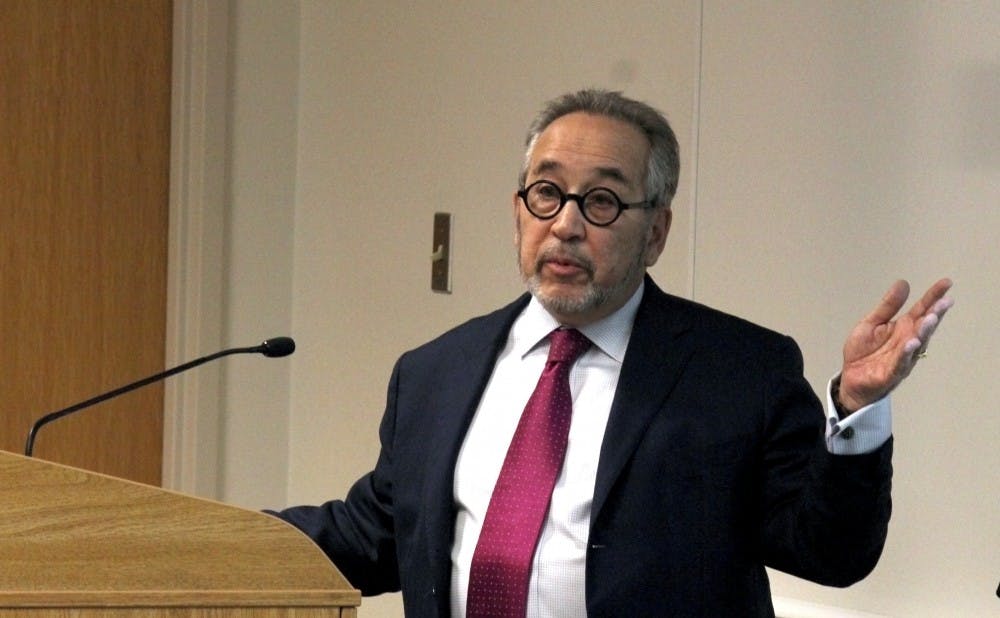To continue the ongoing discussion about for-credit online classes, an online forum for faculty opened Monday.
The Arts and Sciences Council launched the forum on Sakai to encourage faculty to take part in an online discussion on online teaching and learning. The forum was launched a month after a proposal to allow students to take up to one online class for credit was presented to the council. The forum will run for a month until early March.
“This is the first time this has ever been done,” said council Chair Thomas Robisheaux, Fred W. Schaffer professor of history. “The hope is to spark the discussion between a physics professor and an African American studies professor, or a biology professor and a philosopher.”
Robisheaux noted that even though no decision has been made on the proposal yet, a lot of discussion is going on around online education, and the forum allows conversations across departments to take place.
“It is set up to invite faculty to express their views about different types of online teaching, where it can enhance a course, where we need to be cautious, the implications for undergraduates here and for training of the next generation,” Robisheaux said.
In April last year, a proposal to enter the 2U Semester Online platform, an online consortium of 10 schools that offers online classes for credit, was voted down by the council. Although the University currently has no plan to join the 2U online consortium again, faculty members can decide at their departmental level what platforms and methods they can use, Robisheaux said.
“There is an implicit trust in individual faculty members and departments to make decisions they consider appropriate for their discipline,” Robisheaux added.
Emma Rasiel, associate professor of the practice of economics, is currently teaching an online class on Behavioral Finance for credit through the 2U platform. Half of the class is asynchronous and self-paced, which includes recorded materials, surveys, readings and assignments that students need to do in their own time each week. The other half of the class contains a synchronous section every week where the professor and students meet online through Adobe Connect.
“It’s been going really well and it is really interesting. I’m certainly hoping to do it again next Spring,” Rasiel said.
Offering online course for credit expands the options students have in course selection, Rasiel said. Students studying abroad would still be able to take a Duke course online if they want to, and students taking a leave for medical or personal reasons would be able to get course credits through the online platform. Moreover, having online courses for credit available from more than just Duke would enable students to take courses for credit if Duke does not offer them, she said.
Senior Andrew Henick, who is enrolled in Rasiel’s class, said that because it is online, it allows students with scheduling difficulties to take classes they really want.
Law professor Thomas Metzloff taught a portion of his contemporary constitutional law class through 2U last semester and said online class for credit provides scheduling flexibilities especially for athletes, students taking summer classes and students who want to graduate a semester early.
“It is also helpful for students to have some materials that they can work through at their own pace,” Rasiel added. “We spent nearly a year preparing all of that material, so it’s very modularized. And when we are all online together, I know everyone has worked through the material and we will have an active discussion.”
The flexible format of online classes has garnered positive responses from students.
“The way the class is organized made it more enjoyable that a lot of other classes I’ve taken a Duke,” said senior Johnny Wei, who was enrolled in Mezloff’s class last semester.
Metzloff said that the 2U platform appealed to him because it guarantees a small-group classroom environment and enables him to present course material more efficiently.
“I felt that this class would work better in the online format because we had a lot of digital material such as documentaries on Supreme Court cases, which would be better utilized in the online format,” he said. “We were able to improve the quality of the course by developing high-quality online material that the 2U platform permitted us to do.”
Wei noted that online learning would be very beneficial if it is well incorporated into the curriculum.
“Certain classes could benefit from embracing an online component,” Wei said. “I’d have preferred my intro bio or [organic chemistry] class more if I could have watched lectures online instead of having to sit and pay attention in class in order to learn the material. If implemented well, online classes could greatly enhance the educational experience for all Duke students.”
Get The Chronicle straight to your inbox
Signup for our weekly newsletter. Cancel at any time.

